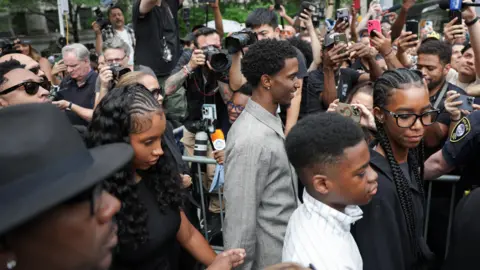‘Diddy’ cleared of sex trafficking and racketeering, convicted on two other charges
33 minutes agoMadeline Halpert & Sakshi VenkatramanBBC News, New YorkReporting fromCourt
Music mogul Sean “Diddy” Combs has been found not guilty of racketeering and sex-trafficking charges, but guilty of transportation to engage in prostitution after a nearly two-month long federal trial in New York City.
Prosecutors had accused Combs of using his celebrity status and business empire to run a criminal enterprise to sex traffic women and conceal his crimes.
A panel of 12 jurors deliberated for 13 hours before acquitting Combs of three of the most serious five charges he was facing.
The rapper had admitted to domestic violence, but denied any non-consensual sexual encounters or a larger racketeering scheme.
The mood in the courtroom was extremely emotional after jurors told the court they had acquitted Combs of the most serious charges of racketeering and sex trafficking.
Before Combs left court, he got on his knees, put his face into his chair and appeared to be praying. He was shaking.
The judge will consider whether to release Combs on bail at 13:00 EST (18:00 BST).
The verdict comes after jurors on Tuesday told the court that they had reached a decision on the sex trafficking and transportation to engage in prostitution charges against Combs, but they were unable to reach a verdict on the racketeering count.
The jurors said they had had “unpersuadable” opinions on both sides about the charge, which is the most complicated of any of the counts Combs was facing and also the most severe.
Racketeering conspiracy, or directing an illegal enterprise under the Racketeer Influenced and Corrupt Organizations Act (Rico), is the formal name for the charge.
To convict Mr Combs on this charge, prosecutors had to prove that he used his loyal network of associates to run a criminal enterprise to commit crimes including sex trafficking, kidnapping, drugging and obstruction of justice.
In this case, that network would include his employees, who prosecutors argued played a part in setting up the “freak-offs” at the centre of the case.
Defence lawyers argued that the case cannot be considered to be racketeering if members of Mr Combs’ staff were not knowingly complicit.
Prosecutors called more than 30 witnesses over the course of the seven-week trial, including
They alleged

 Reuters
ReutersThe government relied on testimony from Ms Ventura, taking the stand at eight-months pregnant, who told the court
At the centre of their case was a video of the rapper beating and dragging Ms Ventura in a Los Angeles hotel hallway in 2016, surveillance footage that security employees testified that Combs tried to pay them to delete.
Combs’ attorneys conceded that their client was violent toward women, but argued that his behaviour was motivated by drugs and jealousy, not evidence of a larger sex trafficking and racketeering scheme.
Sex trafficking and racketeering both carry a maximum sentence of life in prison.
Combs is also facing dozens of civil lawsuits alleging sexual assault and violence.
The Harlem-born rapper founded Bad Boy Records in 1993, a label that represented some of the biggest names in hip hop – including Notorious B.I.G. and Usher. He went on to establish a clothing line called Sean John and a variety of other businesses including fragrances, alcohol and even a media company.


Get all the latest trial updates on the BBC Sounds ‘Diddy on Trial’ podcast available wherever you get your BBC podcasts.